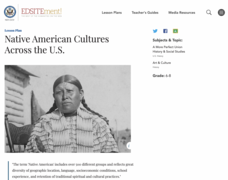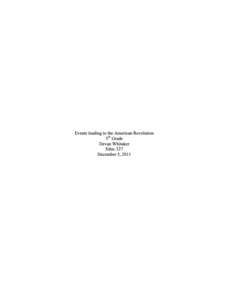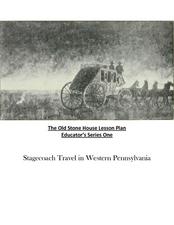National Endowment for the Humanities
Native American Cultures Across the U.S.
Students examine how American Indians are represented in today's society. They read stories, analyze maps, and complete a chart and create an illustration about a specific tribe.
Curated OER
Lesson 1: English-Indian Encounters
What did the English settlers think of the Native Americans inhabiting the Chesapeake region of the United States? Learners analyze a series of documents and images to determine the English perception of the local inhabitants. A great...
National Endowment for the Humanities
Not 'Indians,' Many Tribes: Native American Diversity
Students explore what they thought they knew about "Indians." They examine the Hopi, Abeneki and Kwatiutl tribes in a game-like activity using archival documents.
Stanford University
Carlisle Indian Industrial School
How do policies aimed to help actually hurt? Native American boarding schools—an attempt at assimilating children of indigenous tribes into white culture—had a shattering effect on those who attended. With primary sources, including...
Curated OER
Northwest Coast Indians: Winter Celebrations Potlatch
Upper elementary learners engage in a study about the Potlatch as a Northwest Coast Indians social custom. Groups of pupils plan their own Potlatch ceremony; incorporating activities and creating gifts much like the ones that the Indians...
Curated OER
Northwest Coast Indians: Spring and Summer Salmon
Here is a fabulous lesson about the cultures of the Northwest Indians. Through an exploration of a story about the Salmon People, learners study the practice of harvesting salmon and the cultural importance of salmon to the Northwest...
Curated OER
Native Americans of the Chesapeake Bay: Using Primary vs. Secondary Sources
Discover the rich Native American culture that existed at the time of early European exploration into the Chesapeake region through analysis of several primary and secondary sources.
Manchester University
Events leading to the American Revolution
The Stamp Act, Paul Revere's ride, and the Boston Tea Party pushed American colonists to the tipping point that led to the American Revolution. Fifth graders research the key figures of the war, study the Declaration of Independence, and...
Jamestown-Yorktown Foundation
How Did Relations between Britain and the Colonies Change after the French and Indian War?
What does the French and Indian War have to do with the American Revolution? Following the war, Britain issued the Proclamation of 1763 in an attempt to limit the colonists' western expansion. To understand how the proclamation, the...
Los Angeles Unified School District
Why Is the Declaration of Independence Important?
Fair or unfair? To begin a study of the American Revolution, class members review the treatment of the people of the American Colonies by the King of England and decide which were fair and which were unfair. Class members then annotate a...
Teacher Vision
The Wampanoag Indians: A Thanksgiving Lesson
Spark some lively conversation about American holiday traditions and debunk accepted notions about the first Thanksgiving at the same time. After reviewing the mainstream version of the Thanksgiving story with your class, offer some...
Annenberg Foundation
Native Voices
The Navajo people build their dwellings with the doors facing the rising sun in the east to welcome wealth and fortune. Pupils learn about the traditions of the Navajo people in the first part of a 16-part unit. They explore American...
Jamestown-Yorktown Foundation
Making a Patriot Inquiry: Are Independence, Freedom, and Liberty the Same Thing?
As part of a study of the American Revolution, class members engage in an inquiry-based lesson that has them watch a scene from the play Slave Spy, examine multiple primary source documents, and then discuss the similarities and...
Benjamin Franklin Tercentenary
Join, or Die: Reenacting the Albany Conference
The Albany Congress was one of the first attempts at colonial unity. While it was an effort against the French during the French and Indian War, it was one of the events leading up to the American Revolution. Scholars consider the...
Dream of a Nation
Writing Interdisciplinary Essay
The Grapes of Wrath. The Jungle. Native Son. The Things They Carried. The Absolutely True Diary of a Part Time Indian. To address a current social, political, economic, or environmental issue, class groups pair the reading of a classic...
Curated OER
Deerfield Families
To understand the consequences of the 1704 attack on Deerfield by combined French and Native American forces, groups research primary and secondary resources related to four Deerfield families involved in the attack.
Race Briges Studio
I am Indopino: Or, How to Answer the Question, "Who Are You?"
In our increasingly multi-ethnic society, many learners find it difficult to identify themselves as belonging to any one ethnicity. Gene Tagaban, a Tlingit, Cherokee, Filipino offers his personal experiences with these questions in his...
Curated OER
Understanding Points of View
Investigate the importance of author's point of view. Young linguists study primary source documents related to the Treaty of Casco Bay. The first source is authored by the Native American Chiefs, the second by an English...
Library of Virginia
Antebellum Freedom
From indentured servitude to involuntary race-based servitude, slavery has taken many forms in American history. Class members examine three manumission petitions that reveal how the rights of African Americans and African American...
Curated OER
Old Stone House Lesson Plan
From stagecoach to railroad tracks, your class will discover how advancements in travel in the United States during the nineteenth century played an integral role in the industrialization and development of American society. The main...
Curated OER
The Seven Continents Scavenger Hunt
Who doesn't enjoy an engaging scavenger hunt? Here, scholars listen to, and discuss, the informative text, Where is my Continent? by Robin Nelson. They then explore the seven continents and four major oceans using Google Earth.
Core Knowledge Foundation
Colonial America Tell It Again!™ Read-Aloud Anthology
A read-aloud anthology explores Colonial America. Third graders listen to informational texts, discuss what they heard, and participate in extension activities and writing. Take-home materials, assessments, and remediation opportunities...
Roy Rosenzweig Center for History and New Media
Yankee Doodle: How Has It Changed over Time?
Grab your feathers and your hat! And perhaps some macaroni! It's time to investigate the evolution of "Yankee Doodle Dandy." Groups do a close reading of sheet music covers, lyrics, and even YouTube videos to see how this political song...
Oklahoma Bar Association
Into Which Caste Have You Been Cast?: India's Caste System
What was it like to fit into a certain class with no choice in the matter? Learners experience the caste system in a role-play activity, work individually on handouts to enhance their learning, and participate in an evaluation activity...

























